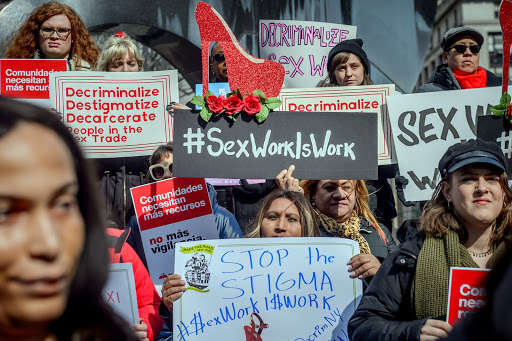May 20, 2025
In a misguided attempt to address exploitation in digital sex work, Sweden has passed a new law criminalizing the purchase of live, on-demand sexual performances conducted remotely, such as those offered through platforms like OnlyFans. The law redefines these virtual exchanges as a form of prostitution, bringing them under Sweden’s longstanding criminalization of buying sex. It will take effect on July 1, 2025.
Under the new legislation, paying for live sexual content — whether via webcam, private video call, or other real-time formats — can result in up to one year in prison. Profiting from or promoting these live performances will also be a criminal offense. While pre-recorded pornography remains legal to buy and sell, the law signals a growing push to expand the Nordic Model (also known as the “Swedish,” “Entrapment,” “End Demand” or “Equality” Model) into digital spaces.
The Nordic Model imposes criminal penalties on clients but not on sex workers. Though often framed as a protective measure for sex workers, researchers and advocates around the world have documented how this model leads to increased policing, surveillance, and stigma. By targeting clients, the Nordic model pushes sex work further underground, making it harder for workers to screen clients, negotiate terms, and work safely — particularly for the most marginalized — including migrants, trans people, and those experiencing poverty.
Sweden’s move mirrors legislative trends elsewhere. In the United States, the passage of SESTA (Stop Enabling Sex Traffickers Act) and FOSTA (Fight Online Sex Trafficking Act) in 2018 made it easier to hold websites liable for hosting content that “promotes or facilitates” prostitution. While touted as anti-trafficking measures, these laws have eroded online safety and chilled free speech. Platforms that once allowed sex workers to vet clients and share safety information quickly shut down or censored content, pushing many into more dangerous, street-based work.
Sweden’s new law will replicate these harms in the online realm, punishing those who rely on digital platforms for income, autonomy, and community. Rather than offering support or resources, such legislation continues to frame consensual adult sex work as inherently criminal, further entrenching stigma and legal risks.
As this law takes effect, sex worker rights groups across Europe and beyond will be watching closely. Its impact may influence other nations grappling with how to legislate sex work in an increasingly digital world and what real protection for workers truly looks like.
Read this statement by the European Sex Workers Rights' Alliance (ESWA) posted on its website:

On 20 May 2025, the Swedish Parliament voted to adopt Proposition 2024/25:124, expanding the criminalisation of sex work to include sexual acts performed remotely (e.g., webcamming, OnlyFans modelling). This shameful decision places Sweden among countries willing to sacrifice human rights, digital freedom, and the voices of its most marginalised in favour of paternalistic ideology that has proven to be harmful time and again.
We are outraged. But we are not surprised.
Despite receiving overwhelming opposition from civil society, academic experts, sex workers, the Swedish government has once again demonstrated its unwillingness to listen. Swedish Parliament has ignored the 1,600 civil rights organisations (including Human Rights Watch (HRW), European Digital Rights (EDRi), Access Now, and several feminist and women’s rights organisations), academic researchers, digital rights advocates and legal scholars and individual supporters — many of them Swedes — who signed our joint statement calling for the rejection of this proposal. In doing so, Swedish lawmakers have chosen to ignore decades of research, including recommendations from the World Health Organisation (WHO), Amnesty International, UNAIDS, and countless peer-reviewed scientific studies, which have consistently shown that the so-called “Swedish model” of client criminalisation deeply harms sex workers, drives the industry underground, increases stigma and reduces access to health, safety and justice.
The parliamentary debate (19th May, 2025) that preceded the vote on this law made the government’s position painfully clear: Swedish lawmakers are not interested in listening to sex workers. They are interested in talking over them. MPs, particularly from the Social Democrats, the Left Party and the Sweden Democrats, used dehumanising, classist and infantilising rhetoric to dismiss sex workers’ voices. One Left Party MP, Gudrun Nordborg, while acknowledging the flood of emails they received against the proposal, questioned whether the articulate messages she received from sex workers could have possibly been written by them, suggesting instead that their words must have been written by pimps. What a disgrace.
This kind of openly classist, anti-feminist and blatantly ignorant attitude is not just deeply offensive; it is dangerous. It reveals a deep contempt for the intelligence and dignity of marginalised people and reaffirms the worst of Sweden’s paternalistic instincts. The debate showed that the Swedish Parliament did not just ignore research, it actively rejected the idea that sex workers are capable of knowing what’s best for themselves. In doing so, Sweden has failed not only its sex workers, but its democratic ideals. We are familiar with such tactics. No matter how we speak, our voices are used against us. When we speak simply, we are dismissed as uneducated or uninformed. When we speak with clarity and eloquence, we are accused of being pimps. In both cases, the goal is the same: to silence us.
This vote is a failure of democracy in Sweden.
Our campaign against this law resonated with many. Media in Germany, France, Belgium, the Netherlands, and beyond amplified the words and warnings of sex workers. Our inboxes overflowed with messages from Swedish citizens who are angry, ashamed and ready for change. Many Swedish organisations and individuals joined us in saying: enough is enough.
We showed that sex workers are not afraid to speak up, organise and demand better. We proved that the Swedish model is not unquestioned and unopposed, and that its supposed moral authority is crumbling under growing scrutiny. We showed that the public support for the Swedish model is no longer a given.
Let us be clear: this law is not protection. It is repression.
Criminalising the purchase of digital sexual services will not stop exploitation. It will only push workers further into the shadows. It will expand surveillance, deepen stigma and introduce dangerous new powers under the guise of protection. Migrant, LGBTQI+, racialised and disabled sex workers, as well as single mothers will be the first to suffer. Platforms will respond with censorship and over-enforcement, punishing sex workers while claiming compliance. And as always under the Swedish model, the harm will extend beyond the law’s text. We know this already. Under the Swedish model, partners, family members and housemates of sex workers are prosecuted as “pimps” simply for sharing housing or household expenses. Police raid homes, seize phones, coerce access to private communications and comb through bank accounts without consent. Sex workers are made homeless by fearful landlords who are worried to be prosecuted. These are not theoretical risks. They are lived realities.
Yet Swedish lawmakers continue to prioritise ideology over impact, arrogance over evidence. They believe they know better than decades of research, and worse, better than sex workers themselves. This is not feminism. This is not gender equality. It is hubris dressed as morality.
We will not accept this law as the end of the conversation. It is only the beginning of the fight. This vote may have passed. But we are not defeated. The movement for sex workers’ rights is stronger than ever. And we are not going anywhere.
We will continue to document the harms. We will continue to fight for justice. We will continue to build power across borders, communities and movements. And we will never stop demanding what sex workers have called for all along:
Full decriminalisation of sex work. Human rights for all. Safety, dignity and agency for every person.
DSW Newsletter #63 (May 2025)
DSW Lobbies for Immunity in Albany

Immunity in Depth

New Orleans Passes Immunity Legislation

Two Federal Bills Threaten Online Speech, Sex Work, and Digital Privacy

Sweden Bans Live Action Pornography, Expands Criminalization of Online Sex Work

